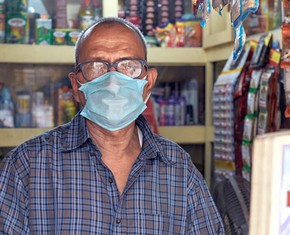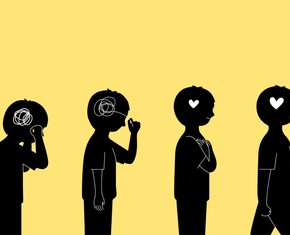The views expressed in our content reflect individual perspectives and do not represent the authoritative views of the Baha'i Faith.
My husband deeply listens to me. He encourages my work and creativity. He seeks my opinion. He takes my advice. He speaks highly of me to others.
That all contributes to a healthy marriage … and we have young adults in our lives who can benefit from this example, too.
This week I’ve been reading a new Harvard research report: “The Talk: How Adults Can Promote Young People’s Healthy Relationships and Prevent Misogyny and Sexual Harassment”. It illumines how young people often talk to each other in degrading ways, especially in cross-gender interactions. The researcher’s focus was on the United States, but many of their findings apply across the planet.
Misogyny—the hatred, dislike, or mistrust of women or simply prejudice against women—and cross-gender harassment towards women have a link to the lack of equality between the genders. The Baha’i teachings make it clear that:
Women and men have been and will always be equal in the sight of God. … Verily God created women for men, and men for women. – Baha’u’llah, from a tablet to an individual Baha’i.
The Harvard report calls on adults to talk about and demonstrate relationships that show respect, caring, and generosity. It asks them to show “how thoughtful, self-aware adults deal with common stresses, miscommunications, and challenges …”
Equality and the gifts of women are part of the respect and balance we all need:
The world in the past has been ruled by force, and man has dominated over woman by reason of his more forceful and aggressive qualities both of body and mind. But the balance is already shifting; force is losing its dominance, and mental alertness, intuition, and the spiritual qualities of love and service, in which woman is strong, are gaining ascendancy. Hence the new age will be an age less masculine and more permeated with the feminine ideals, or, to speak more exactly, will be an age in which the masculine and feminine elements of civilization will be more evenly balanced. – Abdu’l-Baha, Star of the West, Volume 2, p. 4.
Unfortunately, many societies have become highly sexualized. “The Talk” reports on the frighteningly high percentage of 18-25 year-old women who have endured lack of respect in the past by being catcalled, touched without permission by strangers, insulted with sexualized words by men, insulted with sexualized words by women, having a stranger say something sexual to them, and having strangers tell them they were “hot.” Negative and degrading verbal labels related to sex are “stunningly commonplace in many school hallways” across the US, and often the phrases used have violent aspects.

Our media constantly shows adults speaking disrespectfully to each other. It bombards us with images and words that draw us down towards a state that says our sexual lives are more important to focus on than anything else. Pornography is a large contributor. For many people, it becomes difficult to see that:
… man’s supreme honor and real happiness lie in self-respect, in high resolves and noble purposes, in integrity and moral quality, in immaculacy of mind. – Abdu’l-Baha, The Secret of Divine Civilization, p. 19.
When people use verbal interactions that harass and degrade others, they demonstrate their own state of mind and behavior. The Baha’i teachings ask us all to focus on the essential nobility of our souls:
O Son of Spirit! Noble have I created thee, yet thou hast abased thyself. Rise then unto that for which thou wast created. –Baha’u’llah, The Hidden Words, p. 9.
“The Talk” calls on adults to “communicate the importance of young people being self-respecting and respectful in their romantic and sexual lives.” They need to be able to place themselves in the shoes of the other gender from a young age, and see what is challenging for the other person. They need to know what behavior includes misogyny and harassment, and how to behave respectfully instead. They need to know how to have healthy, loving relationships.
What demonstrates equality to me is the mutual respect my husband and I show each other in consulting about all decisions, in sharing our thoughts and opinions, and in showing appreciation for each other’s accomplishments. We generally speak peacefully and kindly to each other and show courtesy and consideration for each other’s well-being. We regularly express gratitude to each other for what we do that provides service to the other. We don’t take any of this for granted, because we’ve worked hard to make our relationship a place of love, respect and courtesy:
O people of God! I admonish you to observe courtesy, for above all else it is the prince of virtues. Well is it with him who is illumined with the light of courtesy and is attired with the vesture of uprightness. Whoso is endued with courtesy hath indeed attained a sublime station. – Baha’u’llah, Tablets of Baha’u’llah, p. 88.
It takes underlying respect and self-discipline for people to monitor their thoughts and words so they create good rather than cause harm. What we say, how loudly we say it, whether it is wise or timely, and our style or tone of voice all affect the impact of our words. Our words are a key distinguishing factor between us and animals. Our speech and what we write reflects our state of maturity. Collectively they also reflect the maturity of our society. What example are we demonstrating to each other and to our young people?
Adults—parents, teachers, coaches, youth leaders, mentors—can “push young people to consider the nature of real honor, courage, and dignity.” It takes courage to see and confront the destructive patterns our society tolerates. It takes commitment to educate ourselves and our young people that it is possible and vital to have healthy and respectful relationships with others. It takes courage to change.
















Comments
Sign in or create an account
Continue with Googleor